2019 Ready Set . . . Sprint!
October 5, 2019
By James Perez
When the idea of hosting a summer launchpad style boot-camp for entrepreneurs, faculty and students alike, it was never anticipated the amount of innovation and raw talent that we would come across. With the collaborative efforts of the Entrepreneurial Institute, on August 30th ,2019 we concluded our second annual faculty-only sprint. Faculty participants from across all of NYU got to showcase their repackaged business proposals highlighting the takeaways of the mentoring provided. With any startup, having an idea is just the first step. Developing that idea into something innovative, marketable yet all the while addressing an everyday issue is not an easy task. Mentoring, simply put, is a crucial tool in the startup arsenal because having an unbiased perspective can help catapult the idea in an entirely new direction without compromising the integrity of the initial idea.
Sandra Duarte and Michelle Bocklage took center stage and reintroduced their platform Missions for Love. Their primary focus is to provide caregivers of kids with disabilities in remote areas the proper services they normally can’t afford. By providing flexible in-person and virtual care services, their goal was to reduce the frustrations that come along with being a caregiver for a child with special needs, ultimately providing a better quality of life. During the customer discovery period, tests and interviews were conducted to help gain focus on what was needed from the caregivers with questions such as:
What have you done to resolve your difficulties? What are your comfort levels using technology and apps? What are the hardest struggles you face?
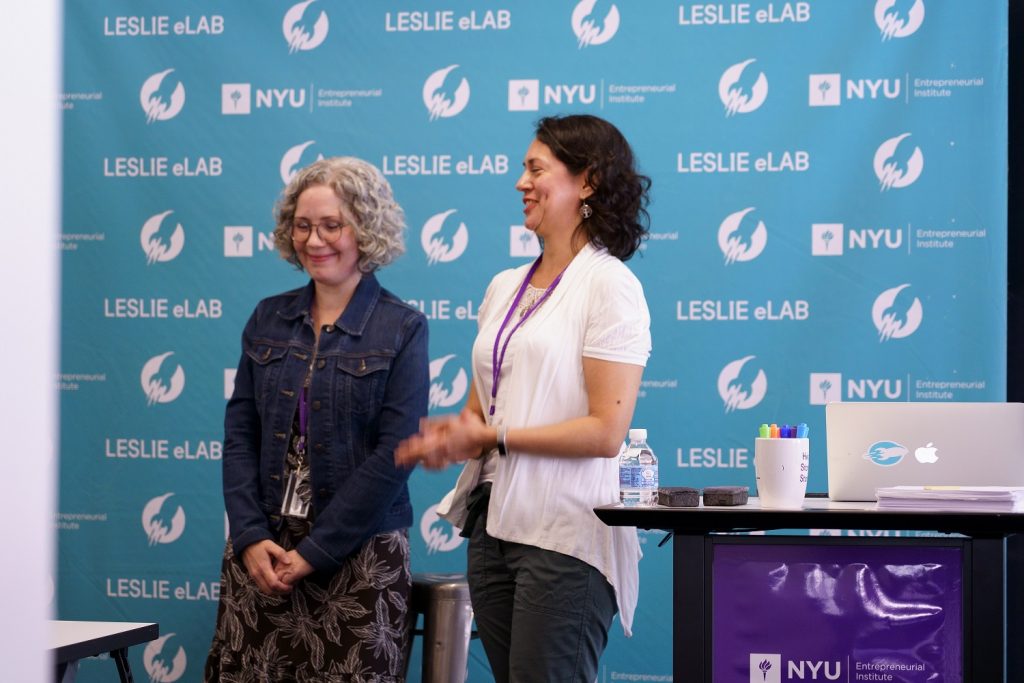
(From left to right: Missions for Love: Michelle Bocklage- Research Assistant & Sandra Duarte OTD Candidate, Steinhardt-Program developer)
Results came back that 1 out of 30 were concerned with their child getting older and the struggles they may endure when they were no longer able to provide care for them. During the Sprint process they realized they had to adjust their original ideas and questioning to develop their idea to something more personal and to discover if there was truly a market need They discovered that here was”an untapped market that was simply addressing everyday issues” according to team member Sandra Duarte. Overall Missions for Love was optimistic about moving forward with the customer discovery process to solidify the integrity of their business model. Within the next 6 months they will be traveling to Ecuador and Thailand to gain alliances, to gain insight on marketing in remote areas.
Next on the roster was QuMem comprised of Kasra Sardashti and Tri Nyugen. Through the coaching feedback they received they were able to develop their business idea: to improve the technology currently on the market by making the quantum computer more reliable. Throughout their research they were able to conduct 11 interviews in 3 different sectors: financial, hardware and academic to see if there was a market they would fit into. In the financial industry there was a readiness, but there was a high error risk rate. From the hardware interviewees, they discovered that the current devices on the market were of bad quality, but the upside was that they were willing to try new beta platforms as long as performance metrics were clear. For the academic sector, they realized that there were too many obstacles and a major problem they could potentially encounter was that there could be competitors, who were already established.
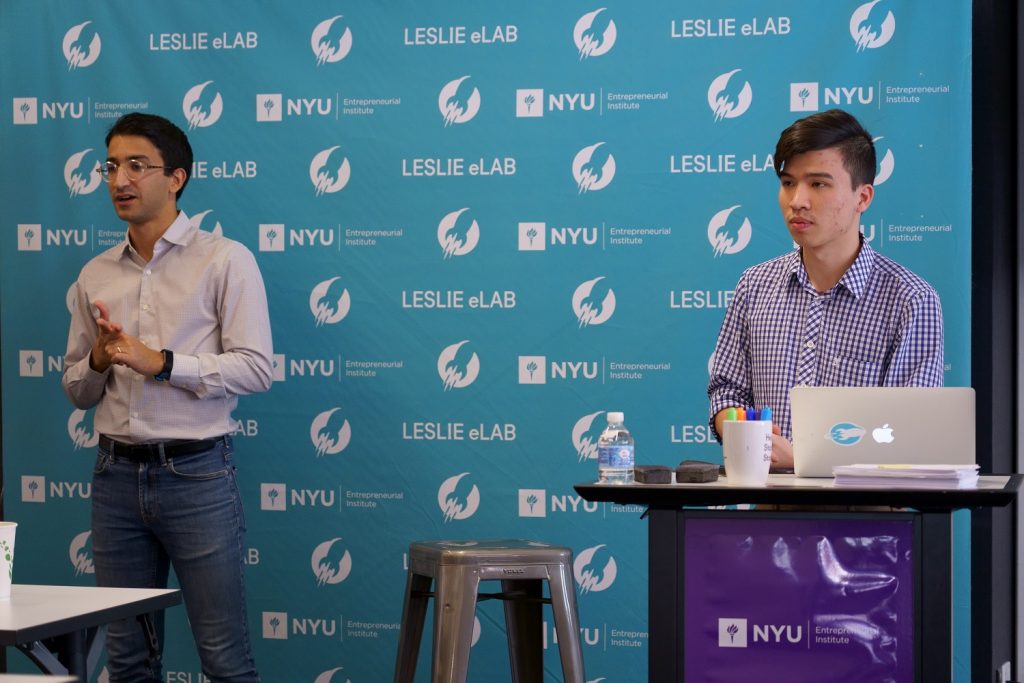
(From left to right: QuMem: Kasra Sardashti, NYU Office of Innovation- Research Scientist and Tri Nyugen, NYU Physics- Lab Assistant)
This entire process for QuMem was an eye opener as they dove head first into researching customer focused issues and realized that there was a long road ahead of them. There definitely was a need for their technology, but they are currently on the hunt for that sector of the market they would thrive most in.
Team Urbane followed and presented their customizable and efficient urban analytics platform that empowers users to interactively analyze multiple layers of 2D and 3D data from cities. They began with an example that showed how seamless it was able to represent noise levels, taxi availability and crime rate of different neighborhoods. The technology could help city planners by using the 3D renderings and proving compliance of new development within zoning regulations. The primary struggle they will face moving forward is that no widget is error free. At times they may have to re write scripts from scratch for each client dependent on the need. Their plan of action is to leave room for expansion. Realizing that their target customer may not know the true potential of their technology rephrasing the thought process for the target audience could prove to be beneficial to both sides.
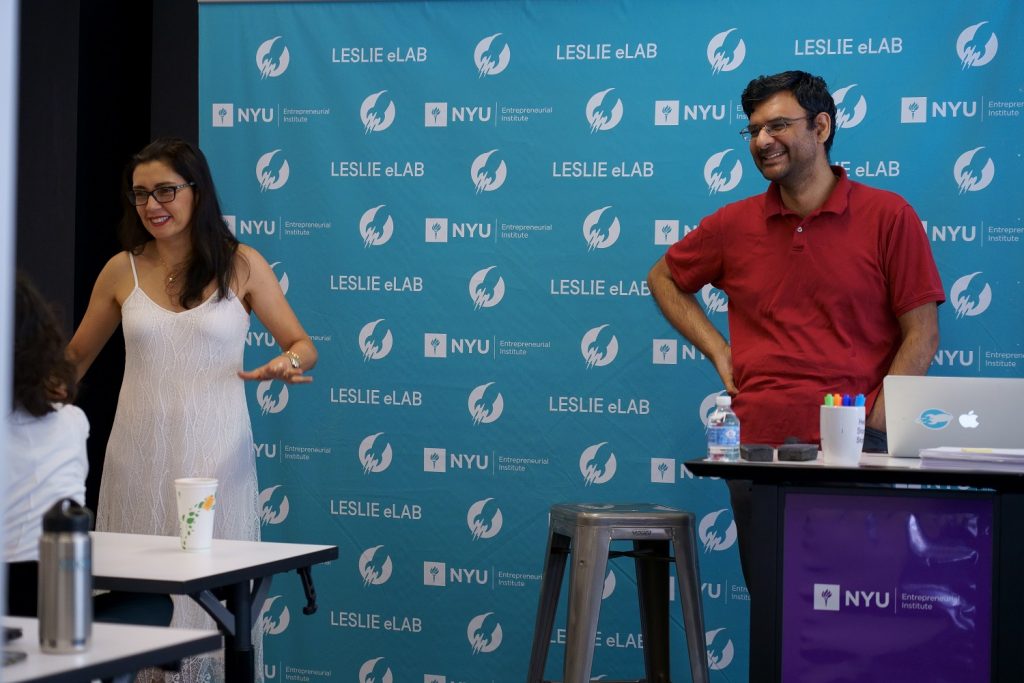
(From left to right: Urbane: Juliana Freire, NYU Tandon- Professor of Data analytics Harish Doraiswamy, NYU Tandon- Research Scientist)
As the presentation line up continued Chipsters, was next up. heir business model is to create a software tool to automate the task of identifying all known security bugs in a system on a chip design to help security and improve chip immunity to vulnerabilities at a much lower cost. Their intended purpose is NOT to design the chip, but to help chip designers by saving them time to test the integrity of their product. Ideally their key clientele would be chip designers and potentially by networking they would be able to build customer relationships. Chip security is still a time consuming process so there is definitely a market, but any hiccup where sensitive data loss occurs could damage the reputation of the company. Overall, team Chipsters plans to revisit their business model and narrow their idea down to fit into a specific market.
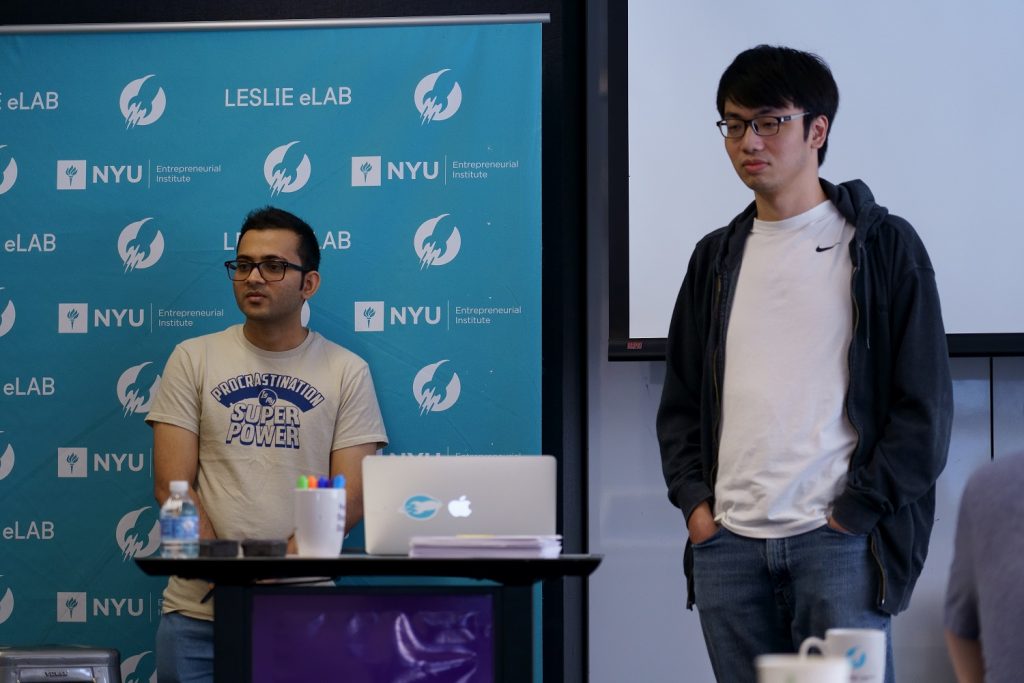
(From left to right: Chipsters: Kartikey Purohit,ECE- MS Student Designer & Yuan Liang, ECE-MS Student Designer )
StudentBody was up next to present their platform, which would improve student success by providing students at 4 year colleges with access to a health chatbot to answer any health related questions and indirectly impact faculty. When revisiting their original business idea their main focus was:
How do we humanize an everyday problem to really focus and address issues?
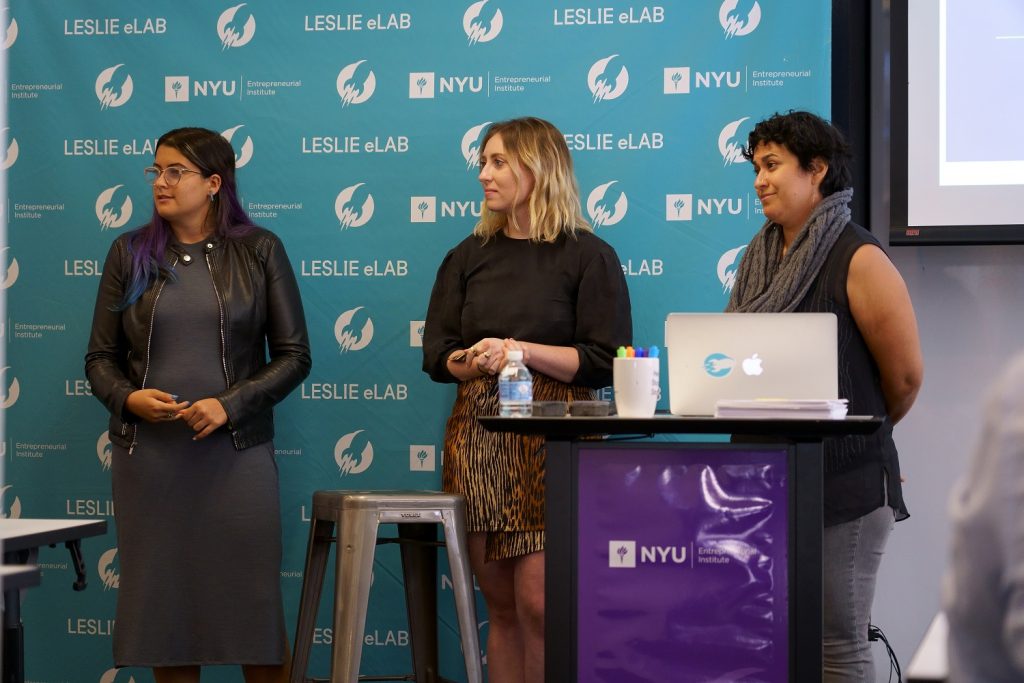
(From left to right: StudentBody:Elizabeth Hucul, NYU College of Global Public Health-MPH, Samaria Filosa ,NYU College of Global Public Health-MPH & Sonia Gonzalez- NYU College of Global Public Healthr- DrPH )
Interviews they conducted revealed that student stress/anxiety levels impacted faculty performance. Because google is so accessible, a large portion of students relied heavily on it to get answers to their everyday health questions, but end up finding scary results which, in turn, made them more stressed/anxious. The startup sprint proved to be an informative process for the team. They gained a direct perspective from their target audience and plan on continuing to dig in deeper to decide whether or not they have something that is potentially patentable. What they do know is that the StudentBody app will need to be 100% scientifically accurate to build a reliable customer relationship.
Continuing with addressing everyday health issues, CarriedAway wanted to provide dental care for children cost-free to parents and schools. An average treatment per student would be approximately 5-7 minutes and could reduce 80% of any untreated dental issue. Initially they would target low income neighborhoods and then consider expansion; being paid through medicaid would allow the use of community mobilization to get kids enrolled in coverage. The upside is kids don’t miss school and parents won’t miss work.
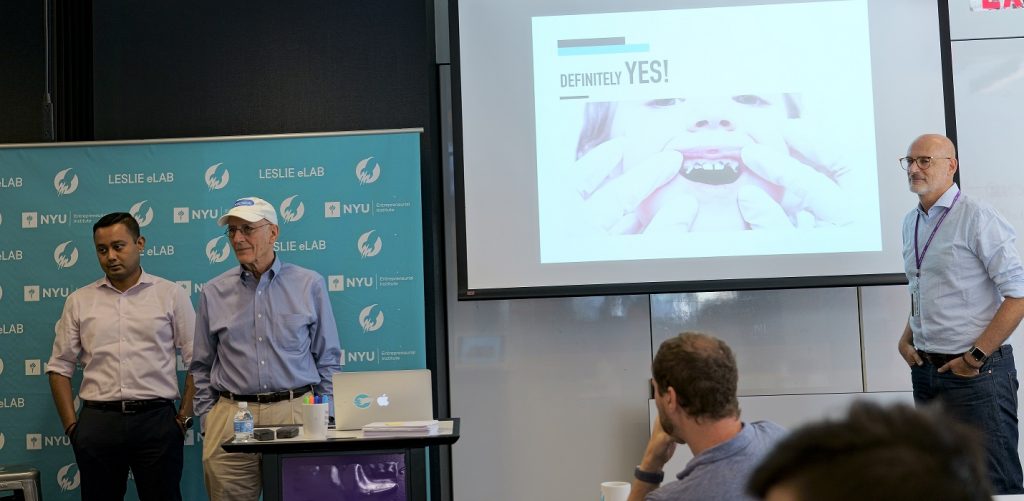
(From left to right: CarriedAway: Richard Niederman, NYU Dental, Habib Benzian, NYU Dental & Pratik Sourav, NYU Langone)
Through the customer discovery process what was learned was Vision/Hearing/Vaccination services are administered through Dept of Health and most schools have no idea how to go about setting this up. An obstacle the team identified was since the personalities of schools varied by location, building a rapport would not be as straightforward as anticipated.
CarriedAway has interviews lined up with companies who are currently active and will study their approach as a guide. Their findings have proven that with a 50% medicaid enrollment, the company would break even on expenses. Being a finalist in the 300K challenge has given the team the motivation they need to continue developing their idea and bringing it to life.
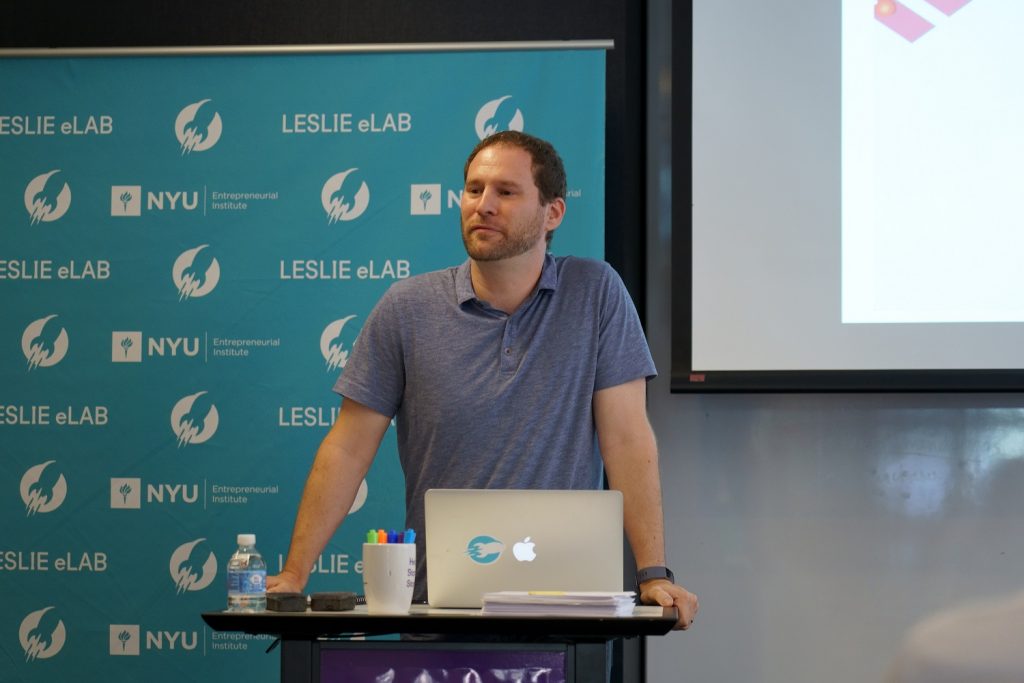
(Above: Open Air: Matt Parker, NYU Game Center– Assistant Professor)
Have you ever wanted to help advocate for the awareness to climate change? Well that’s the plan of action for Open Air. Time is a major obstacle when trying to contribute to any cause of concern, this platform is intended to make it more accessible with an overall goal to build a network and personally connect to bring awareness. heir customer discovery has shown that there is no specific age group that is only affected by climate change. The sprint process has proven beneficial because it allowed them to realize that there are more unanswered questions that needs to be addressed They have structured their plan of action, but still need to conduct some more interviews.
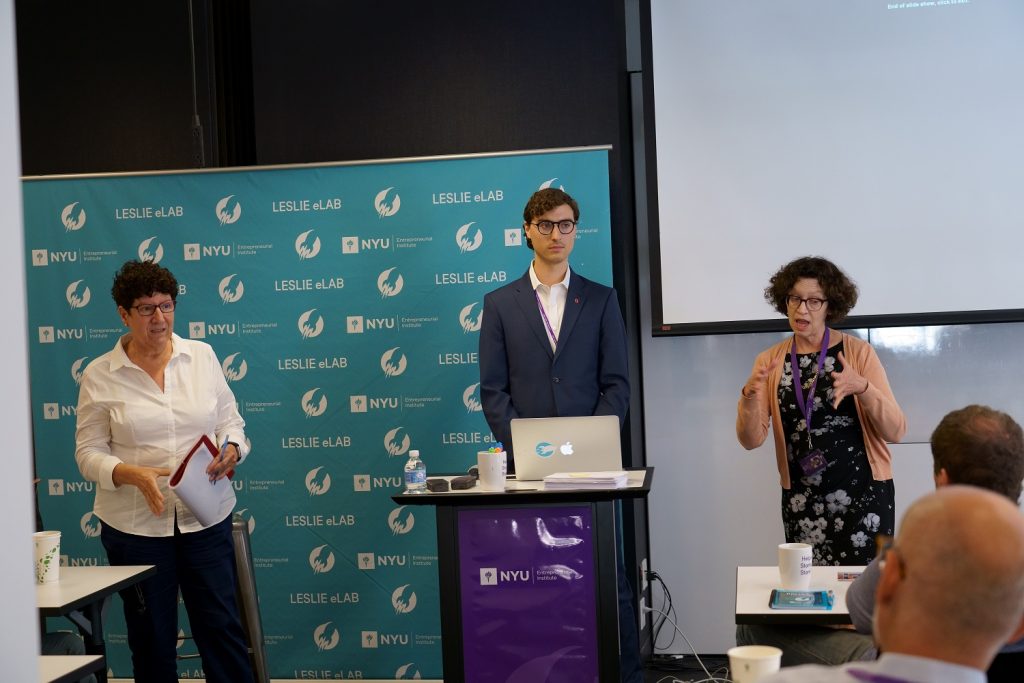
(From left to right: ePVA: Nadia Sultana, Rory Myers College of Nursing- MBA, RN, Clinical Assistant Professor , Anthony John Kostelank, Rory Myers College of Nursing-BS Nursing & Janet H. Van Cleave- Rory Myers College of Nursing- PhD Assistant Professor, Oncology Nurse)
The blows that come along with receiving a cancer diagnosis are often overlooked. Team ePVA has developed a platform (including an app) to be used as an intake assessment management tool for cancer patients. Symptoms experienced by cancer patients can be difficult because the diagnosis is life changing; the platform aims to address these side effects with real time intervention.
The interview process showed that 90% of patients found the app easy to use. While the initial target audience,were the users, the real target audience would be the care providers for these patients. Even in the early stages of development ePVA has caused a buzz of interest for their software in the medical field and the team is excited to continue on.
The 5.5 day mentoring and customer discovery process, although rigorous, proved to be crucial. Each team had restructured and developed their business models, some even shifted their target audience to be more specific instead of being broad. All 7 teams collectively conducted 242 interviews. Professor Jin Montclare, Director of The Convergence of Innovation & Entrepreneurship (CIE) Institute was able to share with the faculty teams that as they continue on, follow on funding awards are available through the NSF. Coaching will continue to be provided by the Entrepreneurial Institute to show continued support in their development. We want to thank our 2019 participants and are looking forward to what everyday issues next Summer’s participants will address.
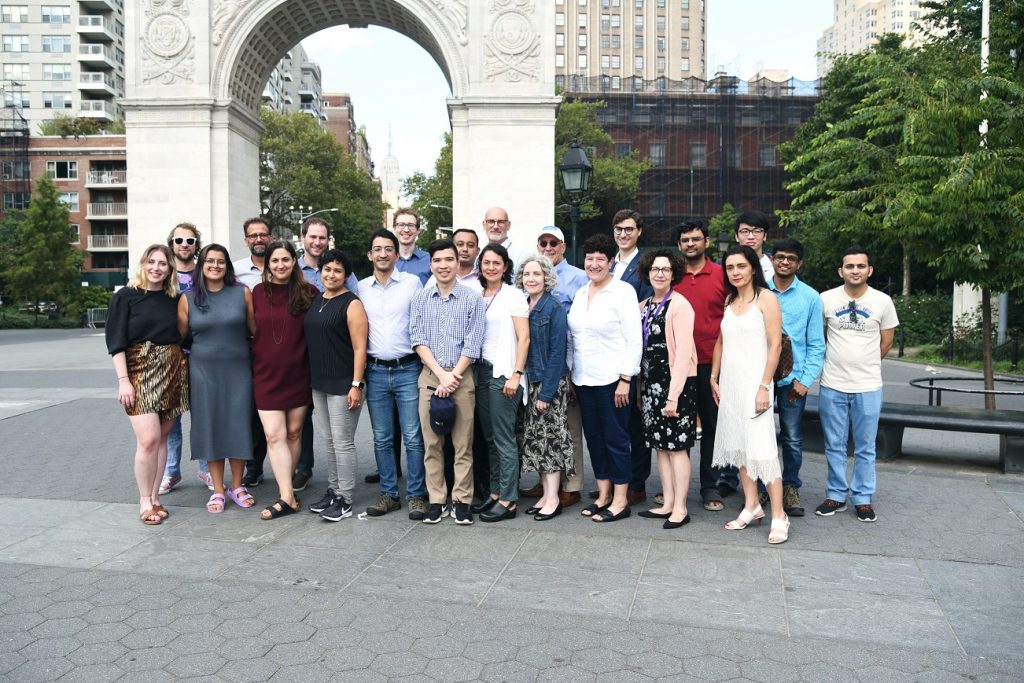
(Above: Summer 2019 Faculty Startup Sprint Participants)
